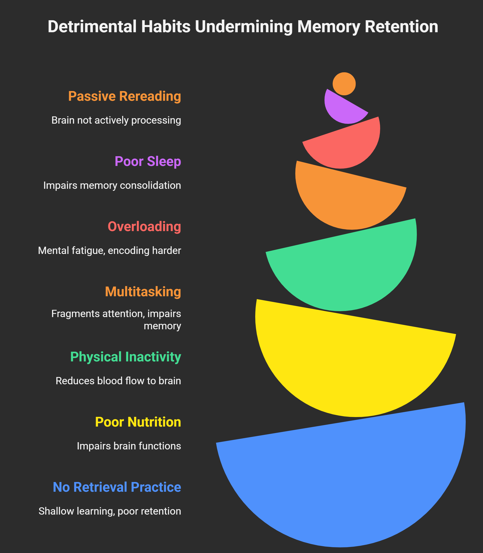7 Bad Habits That Secretly Destroy Your Memory During Study (And How to Fix Them)
- Sep 24, 2025
- 3 min read

7 Bad Habits That Secretly Destroy Your Memory During Study
Introduction
Good memory is crucial for learning and exam success. However, several everyday habits can significantly hinder your ability to store and recall information. Awareness is the first step to change. Let’s explore 7 bad habits that secretly destroy your memory during study sessions and practical ways to fix them.
1. Passive Rereading of Notes
Re-reading notes or textbooks passively is ineffective; the brain isn’t actively engaged, leading to poor retention.
Tip: Use active recall by testing yourself on the material without looking, and practice spaced repetition to reinforce memory.
2. Poor Sleep Habits
Insufficient or inconsistent sleep affects memory consolidation, reducing your ability to retain new information.
Tip: Maintain a regular sleep schedule and aim for 7-9 hours of quality sleep, especially before study sessions and exams.
3. Overloading Without Breaks
Long study sessions without breaks cause mental fatigue, making it harder to encode information properly.
Tip: Use techniques like the Pomodoro method—study intensely for 25 minutes, then rest for 5 minutes—to keep your brain fresh.
4. Multitasking During Study
Switching between tasks or distractions (smartphones, notifications) fragments attention and impairs forming lasting memories.
Tip: Create a distraction-free environment and focus on one topic or task at a time for deeper learning.
5. Lack of Physical Activity
Physical inactivity reduces blood flow and oxygen to the brain, which negatively impacts cognitive functions including memory.
Tip: Incorporate regular exercise or even short walks to boost brain health and retention ability.
6. Poor Nutrition and Hydration
A bad diet and dehydration can impair brain functions, reducing concentration and memory encoding.
Tip: Eat a balanced diet rich in omega-3s, antioxidants, and stay hydrated throughout your study day.
7. Not Practicing Retrieval
Not self-testing leads to shallow learning; memory strengthens through retrieval rather than passive review.
Tip: Frequently quiz yourself and teach others what you’ve learned to reinforce retention and understanding.
Conclusion
Eliminating these 7 bad habits can significantly enhance your memory and study effectiveness. Combine healthy lifestyle changes with active study techniques for best exam preparation results.' 10 Student Questions with Answers
Q: Why is passive rereading of notes not effective for memory?
A: Because it doesn’t actively engage your brain; active recall strengthens memory by forcing your brain to retrieve information.
Q: How much sleep is ideal for better memory during study?
A: Aim for 7 to 9 hours of consistent, quality sleep to help consolidate what you learn.
Q: What is the Pomodoro method, and how does it improve memory?
A: It involves studying for 25 minutes, then taking a 5-minute break to prevent mental fatigue and help memory encoding.
Q: How does multitasking harm memory during study sessions?
A: It breaks your concentration and prevents deep processing, making it difficult to form lasting memories.
Q: Can physical activity really affect my ability to remember?
A: Yes, exercise increases blood flow and oxygen to your brain, improving cognitive performance and memory.
Q: What kind of diet helps improve memory for studying?
A: A balanced diet rich in omega-3 fatty acids, antioxidants, and staying well hydrated supports brain health.
Q: How can practicing retrieval improve my study results?
A: Self-testing forces your brain to recall information, which strengthens memory far better than simple rereading.
Q: What’s a good way to practice retrieval if I study alone?
A: Use flashcards, take practice quizzes, or explain topics aloud as if teaching someone else.
Q: How can I create a distraction-free study environment?
A: Turn off notifications, keep your phone away, and focus on one topic at a time to maximize attention and retention.
Q: How often should I take breaks during study to protect my memory?
A: Use short, frequent breaks such as every 25 minutes with the Pomodoro technique to keep your brain fresh. #StudyHabits #MemoryLoss #LearningTips #ExamPreparation #ActiveRecall #StudySmart #MemoryBoost #AcademicSuccess #ExamTips #StudentLife #Focus #BrainHealth #StudyMotivation



_edited.jpg)


































monero miners monero miners
monero miners monero miners
monero miners monero miners
monero miners monero miners
monero miners monero miners
monero miners monero miners
etc mining etc mining
monero miners monero miners
monero miners monero miners
monero miners monero miners
monero miners monero miners
monero miners monero miners
monero miners monero miners
etc mining etc mining
monero miners monero miners
monero miners monero miners
monero miners monero miners
monero miners monero miners
monero miners monero miners
monero miners monero miners
etc mining etc mining
monero miners monero miners
monero miners monero miners
monero miners monero miners
monero miners monero miners
monero miners monero miners
monero miners monero miners
etc mining etc mining
monero miners monero miners
monero miners monero miners
monero miners monero miners
monero miners monero miners
monero miners monero miners
monero miners monero miners
etc mining etc mining